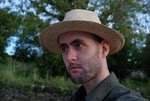
“Do you see the way he stares? It's unnerving”
“I wonder if he has any hands?”
“What might be the significance of the wine bottle?”
The photographer moved about the exhibition silently, dodging guests munching canapes and sipping champagne. He barely brushed their suits nor crushed the silk of their dresses as he wafted by without recognition.
It wasn't that he was unknown in the industry, it was just that these people, this assembled throng of monied patrons had sniffed the scent of 'the next big thing', of 'a sound investment'. They didn't care whom the artist was; the name was unimportant until it truly carried value. At the moment his name was simply spelled: 'Potential'.
You might ask why the photographer himself was even there. He asked, but the curator just tugged at his arm in an over-familiar manner and said: “Oh come now, Baker, I need you there as the deal clincher... if anybody's wobbling on a sale, I bring you in to charm them into the bag.”
So far he hadn't been called into action to perform his reverse snake-charming trick. The gallery had already made four sales, with the minimum of fuss. A red sticker against the glass frame of the large black and white prints gave that away.
All the sales so far had been of landscapes. They were an easy sell. But the portraits, now there's a different matter. How does one convince another that a portrait of somebody they've never met before, and likely never will, should hang forever more in some corner of their home – and that they should pay close to a grand for it?
Still, Baker was proudest of his portrait shots and felt driven towards their sale. He drew closer to one of his favourites. He'd called it: 'Neil Young fan, number 02758'. The photograph had been taken earlier that year, during the round of summer music festivals that always draw the strangest of creatures out into the open for their annual glimpse of the sun. Baker had paid the subject £20 for the shot, a price that included a glass of wine, a drunken acapella song and the man's ticket stub for the concert – which gave the image its title.
“Aha,” cried the curator of the gallery, breaking off from his schmoozing of the ravenous guests for a moment. “Here is the artist himself. Mr Baker, I wonder if you couldn't spare a few moments of your precious time to talk to some of our most valued patrons, Mr Baker?”
Baker forced a smile, but it came out flat and barely raised north of his lips. “Good evening, ladies and gentlemen, a pleasure to meet you all,” he said with a slow nod. 'Was that over the top?' he thought to himself – he really couldn't be sure.
“Mr Baker,” piped up one of the women, a plump thing with an expensive face, “I wonder, could you tell us a little about your inspiration for this image?”
“By all means,” he said with another forced smile. Inspiration was something he greatly needed at that moment and he searched through his mind for the name of a photographer to help him out.
Everyone seemed to lean in as Baker paused to speak. “Er, well, of course, William Egglestone was my primary influence, as I'm sure you can see.” He doubted anyone would be able to see anything other than a man in a hat, sitting on something waterproof. He felt better.
A tall man in a cap and green jacket who looked like he'd spent all day at the races spoke then, a look of scrunched up confusion on his face: “But surely, Mr Baker, Egglestone is known for his documentary of the ordinary, the mundane. I'm sure you'll agree, this subject isn't the sort of pristine, banal capture that Egglestone favours.”
Baker hid his scowl and the grinding of his teeth as best one can when caught out like that and, grabbing a discarded glass of wine from a nearby table, knocked back half the champagne in one before turning upon the man with gusto.
“Of course, you've failed to see past the obvious in this image. Yes, there is a strange young man in the photograph. Somewhere between grainy and pristine, akin to the close portraiture of Robert Frank. But look beyond the man, look deep into the image, at the fragments of canvas and grass and the stink of cheap red wine. That sir, is the hallmark of William Egglestone!”
And with that he polished off the remains of the bubbling vintage he held in his hand, and swept away to a darkened corner of the room. He wondered if perhaps here he could retire from the unceasing and unnerving stare of the punters and just be. Perhaps here he would become unknown and unnoticed once again?
Whatever happened next, he knew it would not last for long.









